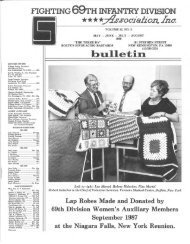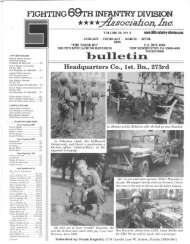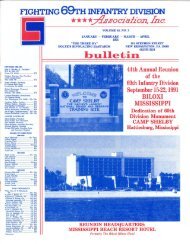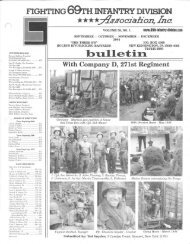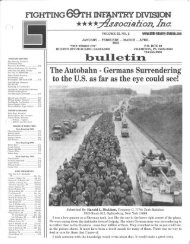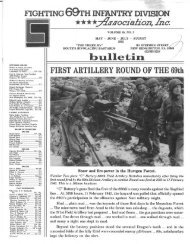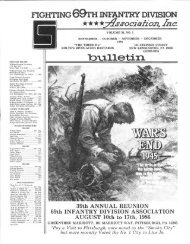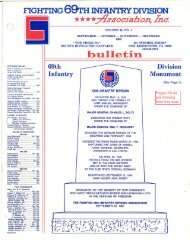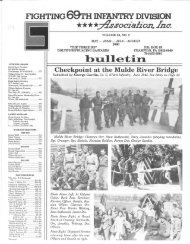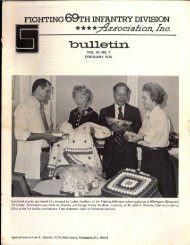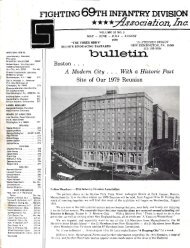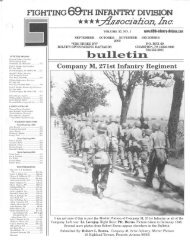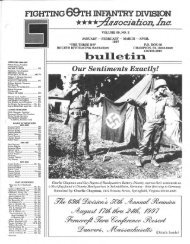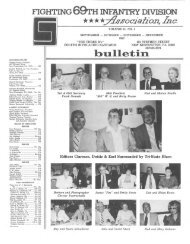The Fighting 69th Infantry Division Association, Inc. Vol. 57 No. 3 ...
The Fighting 69th Infantry Division Association, Inc. Vol. 57 No. 3 ...
The Fighting 69th Infantry Division Association, Inc. Vol. 57 No. 3 ...
You also want an ePaper? Increase the reach of your titles
YUMPU automatically turns print PDFs into web optimized ePapers that Google loves.
PERSONAL HISTORY OF WWII<br />
(Co ntinued from Page 32)<br />
At Ft. Benning, there was no fooling around. If a<br />
student could not keep up with the class, it was out the<br />
door. We were quartered in one ofthe old Quadrangles.<br />
<strong>The</strong> food was excellent and there were no duties. We<br />
got up, made up our bunks and fell out for Reveille and<br />
Roll Call, then marched off to class. At the end of the<br />
day the order was reversed. Mter Roll Call and Retreat<br />
Parade, we were free until the following morning.<br />
Many of the people in my barracks were Paratroopers<br />
and I became quite friendly with a few of them. <strong>The</strong>y<br />
could be a pretty wild bunch over the weekend but<br />
during school days you couldn't find a more dedicated<br />
group anywhere. <strong>The</strong>y also tried their best to convince<br />
me that I should join them. I even got a tour of their<br />
jump school on the other side of the base.<br />
Besides having to achieve a certain level of pro efficiency<br />
in Morse Code and traffic handling procedures,<br />
we received training in Telephone line laying and<br />
Switchboard operation as well as Message Center and<br />
Crypto operation. By graduation we were thoroughly<br />
familiar with and had received hands-on experience<br />
with every communications medium in use from<br />
<strong>Division</strong> down to Company level.<br />
Out of about 100 students who completed the<br />
course, I graduated close to the top of my class. While<br />
I was at school, the 98th <strong>Division</strong> went overseas.<br />
Rather than go through a Replacement Depot I tried to<br />
join the Paratroopers, but because I was only there on<br />
temporary duty the school had no authority to transfer<br />
me. By pulling a few strings in the RA network (it still<br />
existed) combined with my high grades in the Operators<br />
Course, I was enrolled in an advanced Course in<br />
Electronic Maintenance and Repair. This would give me<br />
three more months of training. This Course was strictly<br />
technical in nature: Covering repair and maintenance<br />
of electronic equipment. Although I received passing<br />
grades throughout, I graduated in the lower middle of<br />
the class. Mter a weekend Graduation Binge in Phenix<br />
City, Alabama with some of my Paratrooper friends, I<br />
received my train ticket and Orders to report to the<br />
<strong>69th</strong> <strong>Infantry</strong> <strong>Division</strong> in Camp Shelby Mississippi.<br />
With two scarce MOS, (Military Occupational Specialty)<br />
Numbers, I would have it made, or so I thought. I did<br />
not yet know the Army.<br />
Arriving at the Hattiesburg, Mississippi train depot<br />
I made the obligatory telephone call to <strong>Division</strong><br />
Headquarters and a short while later, a jeep and driver<br />
picked me up. My soon to be deflated ego was flying<br />
high: Here I was one of the best trained communications<br />
people in the whole Army about to take on a very<br />
important assignment, maybe even with a promotion.<br />
I reported to the <strong>Division</strong> Personnel Office. A buck sergeant<br />
took my papers, glanced at them, and made a<br />
phone call. <strong>No</strong> <strong>Division</strong> level assignment for me. I was<br />
being sent to a Regiment. At Regimental Headquarters<br />
the routine repeated itself and off I went to Battalion.<br />
At Battalion Headquarters, a T-5 Cpl. took my papers<br />
and went into an adjoining room: A voice said, "Send<br />
- 33-<br />
him down to L Company." <strong>The</strong> little T-5 said OK but it's<br />
a shame, this guy just finished 6 months training in<br />
Com. School: It sure seems a waste sending him to a<br />
Rifle Company. (Thank you Corporal Groom, I will<br />
never forget you as long as I live). Mter some more<br />
discussion, it was decided to keep me in Battalion<br />
Headquarters to fill an anticipated opening as a Radio<br />
Operator. I was told to report to S/Sgt Hall in the<br />
Radio Sectior.. I was assigned as one of four CW<br />
Operators and would back up the Maintenance Tech.<br />
Headquarters Company of the 3rd Battalion, 273rd<br />
Regiment, <strong>69th</strong> <strong>Infantry</strong> <strong>Division</strong> would be my home<br />
for the duration of the War.<br />
It did not take me long to fit into the group. Sgt. Hall<br />
was pretty laid back and the guys were all easy to get<br />
along with. Acceptance by the Section was made easier,<br />
as Sgt. Biller, the Radio Maintenance Tech and I had<br />
met and become good friends at Ft. Benning some<br />
three months earlier. He was in the class which preceded<br />
mine; we had met by chance and hit it off well<br />
together. We remained lifelong friends and visited each<br />
other in Cumberland Md. until Jim's death sometime<br />
in the 80's. Little did we imagine when we said goodbye<br />
after his graduation, that a month later we would<br />
find ourselves in the same Company and Platoon. In<br />
fact we occupied adjoining bunks.<br />
<strong>The</strong> <strong>69th</strong> <strong>Division</strong> had just completed its final field<br />
training, and it was accepted fact that we would soon<br />
be going overseas. We were issued the latest in equipment.<br />
For communication with Regiment and upward,<br />
our old SCR 284 was replaced by the smaller lighter<br />
and generally better, SCR 694. For communications<br />
with the line companies we were issued the brand new<br />
FM model, SCR 300, a back pack model, which weighed<br />
32 lbs. At the Company level they continued to use the<br />
old and not so reliable hand held SCR 536. All radio<br />
equipment except the SCR 694, were battery operated.<br />
In some cases the battery outweighted the instrument.<br />
Batteries were also notoriously short lived and it was<br />
considered wise to carry at least one spare.<br />
After 3 short months and one last furlough home, we<br />
were ready to go. Twice we marched down to the<br />
Railroad Siding and marched back to our Huts an hour<br />
later. (At Camp Shelby we did not live in conventional<br />
barracks, but in tar paper shacks called Huts). <strong>The</strong><br />
Huts had screened openings on all sides and doors but<br />
no glass windows. A Hut typically housed about 20<br />
men. On the 3rd try, we were off for New Jersey. Two<br />
days later, after a final physical we were bussed to<br />
New York and the gang plank of the S.S. Santa Maria,<br />
a converted Liberty Ship. I wish to note that during his<br />
final physical, my friend Jim Biller, then nearly 39<br />
years old was offered, even urged to take a transfer to<br />
a non combatant organization and remain Stateside.<br />
Jim adamantly refused to leave his outfit and remained<br />
with the Company until the end of the war.<br />
I have little comment concerning the voyage. <strong>The</strong><br />
ship was over-crowded. We were fed only two mediocre<br />
meals per day. Many were seasick, and the bunk area<br />
was foul with the mixed odors of cigarette smoke stale<br />
(Continued on Page 34)



